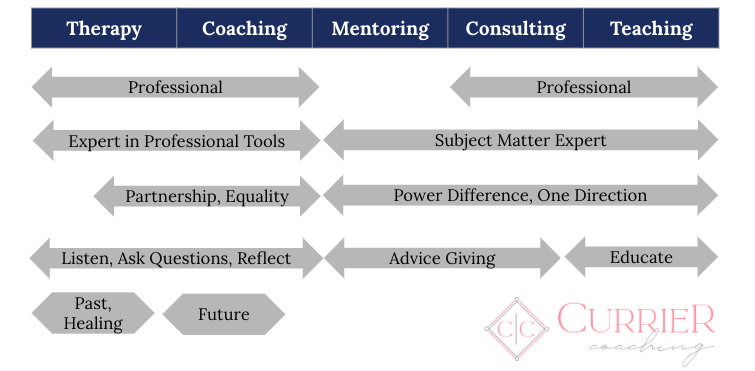What is Coaching?
“A strategic, thought-provoking, and creative process which occurs in interactive conversation that inspires individuals to understand and maximize their full potential.”
“Suzanne’s coaching was a gift. It guided me through decisions and untangled some knots in my thinking.”
— Coaching Client
What do my clients find
most valuable about coaching?
Increasing Engagement
Questions I ask
Objective perspective
Developing Leaders
Safe, confidential space
Challenge & Encouragement
Intentional development
Listening I provide
Learning & Growing
My Coaching Principles
-
Coaching conversations naturally have three acts or phases:
1. Intention
2. Exploration
3. Action
It is most beneficial when the client has done this thinking before the coaching conversation, coming to the conversation with clarity on where they most want to focus and what they want to walk away with.
The client is the driver. The coach has no agenda besides the client’s agenda. They are the partner on the journey.
Lets look at each act individually:
1. Intention: Focus & Outcome Sought - In this phase the client defines what they a) want to focus on in the conversation and b) what outcome they’d like to achieve or leave the conversation with.
a. The focus area (a.) could be anything. Some popular focus areas are career advancement, stress management, difficult conversations, decision making, work life balance, etc.
b. The outcome sought (b.) could be anything as well. Some popular outcomes sought are creating an action plan, defining decision criteria, a list of ideas, just exploration, a next step, etc.
2. Exploration - In this phase the client and the coach partner together to explore the focus area and outcome. This is the art of coaching. It includes the coach listening, asking questions, reflecting, and possibly challenging all to empower the client to achieve new insights, confidence, and clarity and achieve their desired outcome. It is fluid, open, exploratory as well as intentional and purposeful to focus on the coaches intention a and achieve the client's desired outcome.
3. Action Planning - In this phase the client and coach partner together to define what future action the client will commit to take going forward. This is the action between coaching sessions. It may be to think more about something, practice a new skill, have a conversation with someone, do some research, etc. This allows the coach to then be the accountability partner in the next coaching session to inquire to the client if they in fact took the action they intended to, explore what they learned or gained, and to explore if they didn’t complete their committed action what got in the way.
-
Your coach is your partner in the journey to achieve what you desire. The role of the coach is to ask powerful questions, listen, reflect, and empower the client. They are your equal. They believe that you are a naturally creative, resourceful, and whole person completely capable of finding your own answers to whatever challenges you face. They are alongside you to empower you to do just that. The coach is an expert in coaching tools and best practices, you are the expert in yourself, your skills, your context, your experience, etc. Each of us has a unique role to play in the process.
The role of the coach is not to mentor, consult, or teach. Those are distinct and valuable roles, however not the role of a coach. In those roles, there is a power difference where one is superior to the other. In coaching there is equality, not a power difference. Also in those roles the work is done by the mentor, consultant and teacher. In coaching the work is done by the coachee not the coach.
The coach will primarily stay in their coach role, however they can certainly shift into a mentor, consultant and/or teach role if it is requested by the coachee and/or is intentionally defined by the coach.
-
There are no magic wands in coaching (unfortunately). Change, progress, and growth happens little by little. Like steering a big ship in a new direction or waiting for a seed to produce fruit, it happens over time through small action steps.
So in coaching we focus on small shifts, baby steps, experimentation, and practicing new things. These small movements add up, so when you look back over time you can see how far you’ve come.
To do this we focus on action steps, what is something that can be done this week to move you towards your desired outcome. Practice it, try it, push yourself. Then reflect upon the experience. What did you notice, learn, encounter? Share this with your coach.
-
In the coaching relationship, honesty is required. Authentic, vulnerable, real communication is necessary. This is a uniquely safe, confidential and non-judgmental space. If something isn’t working or is frustrating in this relationship please give feedback, directly. I want you to have a great experience and achieve your goals. If something is in your way, let's discuss and resolve it. Remember the conversations are governed by the ICF Code of Ethics.
-
This is a professional relationship, and an investment in yourself so please respect it as such. This includes scheduling and canceling sessions at least 24 hours in advance. Arriving on time and ending sessions on time. Paying invoices on time, etc.
What types of things do my
clients come to coaching for?
Leadership & Management
Making Tough Decisions
Career Exploration
Time Management
Delegation
More Confidence
Grow Assertiveness
Difficult Conversations
Work Life Balance
It can be helpful to understand coaching -
by comparing it to other “helping professions”
As Your Coach…
What I Do:
Actively Listen
Ask Thought Provoking Questions
Reflect What You’re Saying
Enable You to See Blind Spots
Challenge You to See New Things
Empower You to Achieve Your Goals
Resource You with Frameworks, Articles, Tools
What I Do Not Do:
Drive the Conversation
Give Unsolicited Advice
Bring Assumptions
Pressure You
Judge You
Share Our Discussion
“
Suzanne can hear what I am not saying, will let me find my way down the path, and will challenge my assumptions and thinking
.”
— Client
Why Coaching?
“Even though people want and ask for help, it is a natural tendency to resist being told what to do. Outcomes are better when people are helped to help themselves. Facilitating self-determined and self-directed change and problem-solving (coaching), rather than giving prescriptive solutions (consulting/mentoring) leads to better results, outcomes, and accomplishments.”
— R. Hicks PhD, University of Texas Dallas




